I am finally arriving to the point I wanted initially to make about the documentary The Bridge. Initially, I couldn't, because I was so overwhelmed by the emotion of it all; plus, The Bridge is a sort of eulogy for the documentary subjects and I needed to respect that before making an academic point about writing.
During the time that I've kept a blog, I've written several times about the act of writing itself, what it entails. I've written more than once about how love factors into the process for me. But I've said little about the somewhat brutal task that is before all artists, and that task involves making choices.
There are different choice-making processes. A few weeks ago, I did some entries on my yard. I wrote of how I pulled weeds so that my perennials could thrive. Artists, too, have to make hard choices: do I keep this or leave it out? for instance. I think that it can be said that these choices involve also a certain amount of love. You have to make the choice so that your artistic vision can live and thrive.
What I want to write about here is a kind of intelligence that is involved in the composition phase of the work. I saw an example of this intelligence in The Bridge. A photographer describes taking pictures of a woman who makes ready to jump from the bridge. He explains that as long as he was taking the pictures, he was unable to stop her from jumping, because a different brain faculty was in play. He was thinking about composition, light, shadow, drama--those things. In other words, he was using the same faculty that a photo journalist uses when she must frame and shoot tragic or painful subjects. Love, compassion, social responsibility: these concepts take a back seat to the task at hand. It is a laser-beam concentration that synthesizes with all the artist knows about her equipment and her art.
What I'm talking about goes beyond the idea of craft, right to the heart of imagination itself. Many artists have said the imagination is divine, that it is like a bolt of lightening out of the blue or like god telling you things. This seems to describe the kind of associative leap so many artists have.
But I think what I'm talking about here is different from those associative leaps that are so pleasant and exciting to have. It is more cold, more aloof, more rational. It's more than what happens when an editor takes up her pencil.
What I'm talking about strikes at the heart of imagination itself. The imagination is often associated with complete freedom, with wildness, with drunkenness, even. There is automatic writing or free-writing. This form of writing is supposed to release the mind from the constraints of the left-brain, from the internal censor. One writer called this censor "the grandmother on your shoulder." For a long while, it has been believed there are two modes of composition, the "free" writer and the editor, who then comes in and exerts control over the composition.
But is this true? Now I'm thinking that the automatic or free-writer is able to override the censor because she is detaching herself from the material. I'm not talking about that initial phase in the free-writing when the writer pens things like: i hate you, i hate my life, my life is a living hell...
When free- or automatic writing really works is when detachment happens.
Because there is a part of the artist that flies above life, sees it as it "really" is (apart from the emotion that colors it) and so is able to depict events with perfect, compelling, and, yes, emotional accuracy.
It is a paradox, surely. How does one portray emotion by becoming detached from it? I don't know, but I think this is what teachers mean when they tell a student she is too close to her story. I think it's what Tim O'Brien meant in The Things They Carried when he said his writing helped him because he was able to objectify the bad things in his past through the act of storytelling.
Bad poetry may come as a result of unrestrained emotion, Angst. I need to think about all of this more, but what I'm saying here feels true to me. It feels true for now, at least.
So when I say I write out of love, that is true. But when the real writing begins, I'm like the young photographer in The Bridge, a cool, calm portrayer of something (even horror). This detachment is something I've felt more and more as I've given myself over to writing. I struggled for a long time about what I should call it. I'm not finished thinking about this, but for now I'm calling it detachment. I think detachment isn't the perfect word for it, because detachment connotes "uncaring" and this is far from the truth. When I am writing, I feel it in my body.
In other words, I have a warm body but a cool head.
Monday, July 16, 2007
Subscribe to:
Post Comments (Atom)
Pages
Dreaming
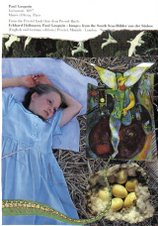
About Me

- Theresa Williams
- Northwest Ohio, United States
- "I was no better than dust, yet you cannot replace me. . . Take the soft dust in your hand--does it stir: does it sing? Has it lips and a heart? Does it open its eyes to the sun? Does it run, does it dream, does it burn with a secret, or tremble In terror of death? Or ache with tremendous decisions?. . ." --Conrad Aiken
Followers
Facebook Badge
Search This Blog
Favorite Lines
My Website
Epistle, by Archibald MacLeish
Visit my Channel at YouTube
Great Artists
www.flickr.com
This is a Flickr badge showing public photos from theresarrt7. Make your own badge here.
Fave Painting: Eden
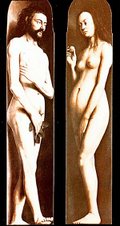
Fave Painting: The Three Ages of Man and Death

by Albrecht Dürer
From the First Chapter
The Secret of Hurricanes : That article in the Waterville Scout said it was Shake- spearean, all that fatalism that guides the Kennedys' lives. The likelihood of untimely death. Recently, another one died in his prime, John-John in an airplane. Not long before that, Bobby's boy. While playing football at high speeds on snow skis. Those Kennedys take some crazy chances. I prefer my own easy ways. Which isn't to say my life hasn't been Shake-spearean. By the time I was sixteen, my life was like the darkened stage at the end of Hamlet or Macbeth. All littered with corpses and treachery.
My Original Artwork: Triptych
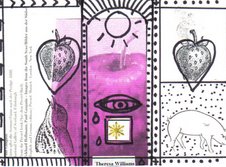
Wishing
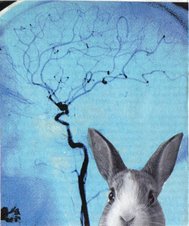
Little Deer
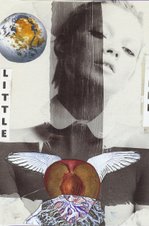
Transformation
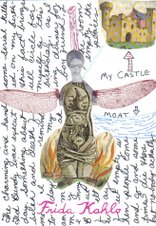
Looking Forward, Looking Back
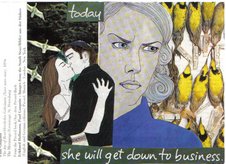
Blog Archive
-
▼
2007
(193)
-
▼
July
(14)
- Cool Me Off!
- Seeking
- Apology, by Richard Wilbur
- Ezra Pound 5
- Politics
- The Sound and the Fury
- What day is this, anyway?
- Theresa's Top 25
- Inspirational
- Dance All Night
- The Point About The Bridge
- The "L" Word
- About Suffering They Were Right, The Old Masters II
- About Suffering They Were Right, The Old Masters
-
▼
July
(14)
CURRENT MOON
Labels
- adolescence (1)
- Airstream (7)
- Alain de Botton (1)
- all nighters (2)
- Allen (1)
- altars (1)
- Angelus Silesius (2)
- animals (1)
- Annie Dillard (1)
- Antonio Machado (2)
- AOL Redux (1)
- April Fool (1)
- Archibald MacLeish (1)
- arts and crafts (55)
- Auden (1)
- awards (2)
- AWP (2)
- Bach (1)
- Basho (5)
- Beauty and the Beast (1)
- birthdays (1)
- blogs (5)
- boats (2)
- body (2)
- books (7)
- bookstores (1)
- Buddha (1)
- Buddha's Little Instruction Book (2)
- butterfly (4)
- buzzard (2)
- Capote (4)
- Carmel (1)
- Carson McCullers (1)
- cats (15)
- Charles Bukowski (1)
- Charles Simic (2)
- Christina Georgina Rossetti (1)
- church (2)
- confession (1)
- Conrad Aiken (1)
- cooking (5)
- crows (1)
- current events (2)
- D. H. Lawrence (3)
- death (6)
- Delmore Schwartz (4)
- detachment (1)
- dogs (7)
- domestic (3)
- dreams (21)
- Edward Munch (4)
- Edward Thomas (1)
- Eliot (3)
- Eliot's Waste Land (2)
- Emerson (2)
- Emily Dickinson (10)
- ephemera (1)
- Esalen (6)
- essay (3)
- Eugene O'Neill (3)
- Ezra Pound (1)
- F. Scott Fitzgerald (1)
- fairy tales (7)
- Fall (16)
- Famous Quotes (16)
- festivals (2)
- fire (5)
- Floreta (1)
- food (1)
- found notes etc. (1)
- found poem (2)
- fragments (86)
- Frida Kahlo (1)
- frogs-toads (4)
- Georg Trakl (1)
- gifts (1)
- Global Warming (1)
- Gluck (1)
- goats (1)
- Goodwill (1)
- Great lines of poetry (2)
- Haibun (15)
- haibun moleskine journal 2010 (2)
- Haiku (390)
- Hamlet (1)
- Hart Crane (4)
- Hayden Carruth (1)
- Henry Miller (1)
- holiday (12)
- Hyman Sobiloff (1)
- Icarus (1)
- ikkyu (5)
- Imagination (7)
- Ingmar Bergman (1)
- insect (2)
- inspiration (1)
- Issa (5)
- iTunes (1)
- Jack Kerouac (1)
- James Agee (2)
- James Dickey (5)
- James Wright (6)
- John Berryman (3)
- Joseph Campbell Meditation (2)
- journaling (1)
- Jung (1)
- Juniper Tree (1)
- Kafka (1)
- Lao Tzu (1)
- letters (1)
- light (1)
- Lorca (1)
- Lorine Niedecker (2)
- love (3)
- Lucille Clifton (1)
- Marco Polo Quarterly (1)
- Marianne Moore (1)
- Modern Poetry (14)
- moon (6)
- movies (20)
- Muriel Stuart (1)
- muse (3)
- music (8)
- Mystic (1)
- mythology (6)
- nature (3)
- New Yorker (2)
- Nietzsche (1)
- Northfork (2)
- November 12 (1)
- October (6)
- original artwork (21)
- original poem (53)
- Our Dog Buddha (6)
- Our Dog Sweet Pea (7)
- Our Yard (6)
- PAD 2009 (29)
- pad 2010 (30)
- Persephone (1)
- personal story (1)
- philosophy (1)
- Phoku (2)
- photographs (15)
- Picasso (2)
- Pilgrim at Tinker Creek (1)
- Pillow Book (5)
- Pinsky (2)
- plays (1)
- poem (11)
- poet-seeker (9)
- poet-seer (6)
- poetry (55)
- politics (1)
- poppies (2)
- presentations (1)
- Provincetown (51)
- Publications (new and forthcoming) (13)
- rain (4)
- Randall Jarrell (1)
- reading (6)
- recipes (1)
- Reciprocity (1)
- Richard Brautigan (3)
- Richard Wilbur (2)
- Rilke (5)
- river (5)
- river novel (1)
- rivers (12)
- Robert Frost (2)
- Robert Rauschenberg (1)
- Robert Sean Leonard (1)
- Robinson Jeffers (1)
- Rollo May (2)
- Rumi (1)
- Ryokan (1)
- Sexton (1)
- short stories (13)
- skeletons (2)
- sleet (1)
- snake (1)
- Snow (24)
- solitude (1)
- spider (2)
- spring (1)
- Stanley Kunitz (1)
- students (2)
- suffering (4)
- suicide (2)
- summer (20)
- Sylvia Plath (2)
- Talking Writing (1)
- Tao (3)
- teaching (32)
- television (4)
- the artist (2)
- The Bridge (3)
- The Letter Project (4)
- The Shining (1)
- Thelma and Louise (1)
- Theodore Roethke (16)
- Thomas Gospel (1)
- Thomas Hardy (1)
- toys (3)
- Transcendentalism (1)
- Trickster (2)
- Trudell (1)
- Ursula LeGuin (1)
- vacation (10)
- Vermont (6)
- Virginia Woolf (1)
- Vonnegut (2)
- Wallace Stevens (1)
- Walt Whitman (8)
- weather (7)
- website (3)
- what I'm reading (2)
- William Blake (2)
- William Butler Yeats (5)
- wind (3)
- wine (2)
- winter (24)
- wood (3)
- Writing (111)
- Zen (1)





1 comment:
Theresa, thank you for this lovely post.
In my work I often talk with people about the idea of stewardship, and I think you've hit at the heart of it. The idea, the story, the writing, is within and without, but when we are in service to the story, it seems mostly to be without -- as if it's a new and separate being. The story sits in the middle of the table, with the writer on one side and the heart and mind on the other. We're all tending what's in the middle, journalists and tale tellers alike.
Post a Comment